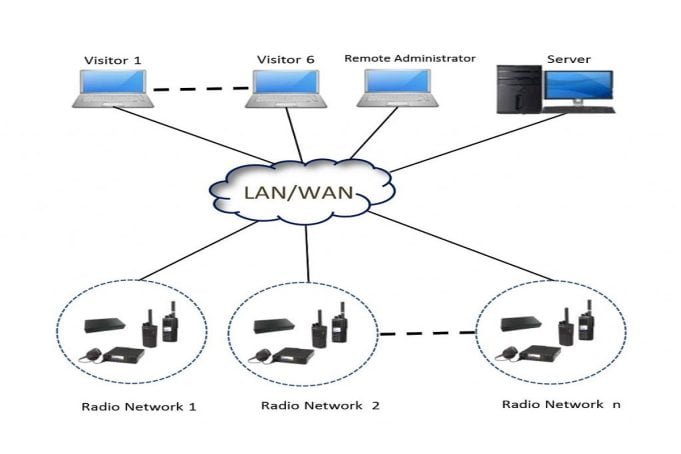Radio users have used microwave equipment and telephone lines to communicate for the longest time. But communication today goes beyond phone calls. Using Internet Protocol (IP), Radio over Internet Protocol (ROIP) broadcasts radio communications.
How Does Radio Over IP Work?
Radio over Internet Protocol is a communication network over the internet for push-to-talk teams. Instead of sending radio waves via the air, ROIP sends the messages as data through the internet. ROIP links individuals with the same push-to-talk communication interface, regardless of the device.
This system allows using one radio device at a time, unlike Voice over Internet Protocol (VoIP). Both systems enable voice communication over the internet. With ROIP, a user must press the push-to-talk (PTT) button. The operation is similar to standard radio communications, only with IP-connected devices.
After pressing the PTT, the user speaks into the hand-held radio. The computer captures their voice, turning it into a radio wave. The Radio over IP gateway receives the data sent across the network.
Radio over IP technology allows for the following:
- Point-to-point linking or site linking by offering a way to connect two or more radios
- IP dispatch or a remote base station, enabling users to control transceivers remotely
- Previously incompatible radio systems to communicate with each other
- PPT for mobile phones and personal digital assistants, enabling Smartphone users to communicate with radio users
As a result, radio over IP is ideal for use by the following:
- Military
- Utility companies
- Emergency operations centers
- Public safety departments
What Are the Advantages of ROIP Systems?
Radio over IP offers the following benefits to organizations that adapt it:
1. Wider Reach
Radio over IP is not limited by location or mode of communication, thanks to interoperability. An interoperable solution enables rapid and secure connections between all stakeholders. Using radio over IP, users may connect across the following:
- Radio frequencies
- Legacy systems
- Dispatch consoles
- Laptops and smartphones
2. Lower Costs
Replacing existing networks with IP technology solutions lowers operating expenses over time. The falling price and rising capability of radio over IP networks facilitate this trend. Radio over IP systems frequently incorporates standard off-the-shelf components like switches and routers.
Radio over IP enables users to connect several two-way radios to each device. There is no need to invest in microwave equipment or rent telephone lines. IP infrastructure (LAN, WAN, or VPN) is already in place as people use IP technology in everyday communications.
Monthly charges for the dedicated call paths that telecom service providers offer do not apply to radio over IP networks. Interoperability features of radio over IP give freedom to select radio manufacturers to fit any budget. The result of all this is significant cost savings.
3. Greater Reliability
The design of a conventional radio system is less reliable than the radio over Internet Protocol network design. Radio over IP has several routes available between nodes. Traditional designs with one route make the entire network inoperable with the loss of a single node.
Radio over IP also uses several technologies to improve voice communication. These technologies include:
- Silence
- Packet aggregation
- De-jittering
Using these technologies saves bandwidth without affecting communication quality through effective signal compression.
Radio over IP also employs an approach that maximizes reliability while consuming the least amount of bandwidth. Simple gateway apps do not have this capability. Utilities that demand dependable communications across a wide region, benefit from this feature.
4. More Stationary Users
Radio over IP offers more assistance for stationary users than traditional radio systems. Computer equipment can produce interference, making land mobile radio (LMR) hard for users like supervisors and dispatchers.
Employees in Emergency Operations Centers (EOCs) frequently use various radios. Radio over IP offers significant communication advantages for personnel in remote locations. The expanded service and reliability are the outcomes of advancements in the internet protocol.
Radio over IP networks’ redundancy also lessens the effects of individual nodes going down. With improved support for immobile users, radio over IP is revolutionizing radio communications.
How Do You Get Started on Radio Over Internet Protocol?
Does radio over IP sound like what your company needs? Find a trusted company providing innovative ROIP hardware and software designs to start. With the right provider, you can tap into the system’s unlimited opportunities.










![What Does Aviates Stand for in Aviation? [The Art of Flying] Aviates](https://tourinplanet.com/wp-content/uploads/2024/07/Aviates-100x75.jpg)














![25 Best Peruvian Foods You Must Try In Peru [With Recipes] Peruvian Food](https://tourinplanet.com/wp-content/uploads/2024/07/Peruvian-Food-100x75.jpg)


